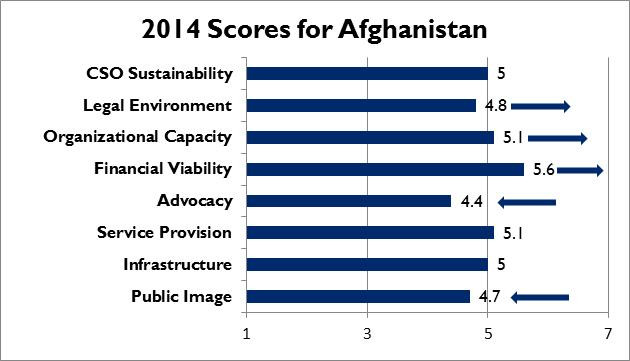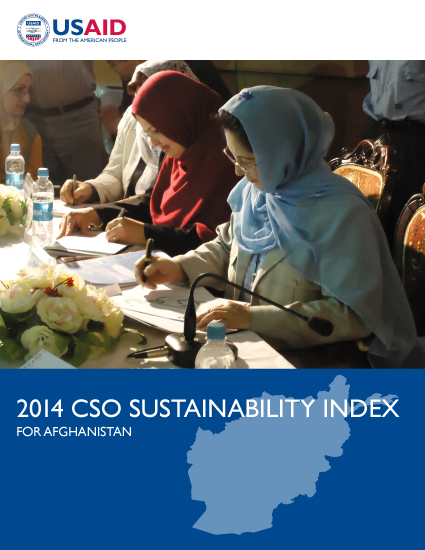- What We Do
- Agriculture and Food Security
- Democracy, Human Rights and Governance
- Democracy, Human Rights and Governance Strategy
- Supporting Free and Fair Elections
- Supporting Vibrant Civil Society & Independent Media
- Protecting Human Rights
- Promoting Accountability & Transparency
- Importance of Democracy, Human Rights, & Governance to Development
- Countering Trafficking in Persons
- Economic Growth and Trade
- Education
- Ending Extreme Poverty
- Environment and Global Climate Change
- Gender Equality and Women's Empowerment
- Global Health
- Water and Sanitation
- Working in Crises and Conflict
- U.S. Global Development Lab
BACKGROUND & APPROACH
The 2014 CSO Sustainability Index (CSOSI) for Afghanistan looks at the sustainability of the civil society sector based on an assessment by local civil society representatives and experts. The CSOSI is an important tool for civil society organizations (CSOs), governments, donors and academics for understanding and measuring the sustainability of the CSO sector. This publication complements other editions of the CSOSI which together now cover 70 countries and territories in Central and Eastern Europe and Eurasia, Sub-Saharan Africa, the Middle East and North Africa, Asia, and Pakistan. The Index scores seven interrelated dimensions of CSO sustainability: Legal Environment, Organizational Capacity, Financial Viability, Advocacy, Service Provision, Infrastructure, and Public Image. These scores are averaged to produce an overall score for CSO sustainability. Details of the methodology can be found here.
FINDINGS
Civil society has long been a crucial actor in addressing a full range of issues in the health, educational, social, cultural, religious, humanitarian, and political arenas in Afghanistan. Since the beginning of the war in Afghanistan in 2001, the international donor community and the government have placed great emphasis on strengthening civil society. According to a study by the Agency Coordinating Body for Afghan Relief and Development (ACBAR) published in January 2015, there are approximately 7,000 CSOs registered in Afghanistan, including 2,000 non-governmental organizations (NGOs) registered with the Ministry of Economy and 5,000 associations (including social organizations, foundations, and unions) registered with the Ministry of Justice. There are also numerous informal and unregistered CSOs, including village-based Shuras (community-based councils), Jirgas (tribal assemblies of elders), and youth movements advocating for change in their communities.

In 2014, Afghanistan held presidential elections, with a first round of voting in April and a second round in June. Widespread accusations of fraud delayed the results until September 2014, when Ashraf Ghani was declared the new president. The resulting National Unity Government, established in September 2014, has proved to be supportive of CSOs.
During 2014, CSOs reached out to communities, and formed strategic partnerships with media, government bodies, the private sector, religious leaders, other CSOs, and international organizations. Such strategic partnerships both within and across sectors strengthened CSOs’ influence in policy reform and development processes in 2014. In addition to playing a critical role in service delivery—especially in the health and education fields—CSOs promoted volunteerism during the elections, monitored the election process, advocated for freedom of speech through a vibrant media, encouraged women’s inclusion in government, championed human rights protection, and actively demanded and monitored good governance. CSOs also improved their self-regulation systems. As a result, CSOSI scores for advocacy and public image in Afghanistan improved.
However, the security situation and political transition presented challenges for civil society in 2014. For instance, declining security in many provinces, and decreased availability of funds curtailed the work of many CSOs. At the same time, the transition presented Afghan civil society with a valuable opportunity to reflect on its work, prompting ideas for more collaboration, new funding modalities, and new ways of working with local communities, international donors, and the Government of Afghanistan.








Comment
Make a general inquiry or suggest an improvement.